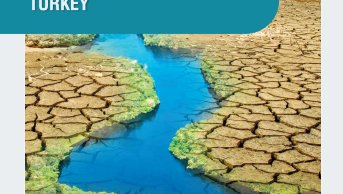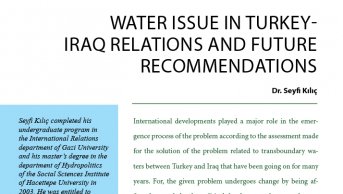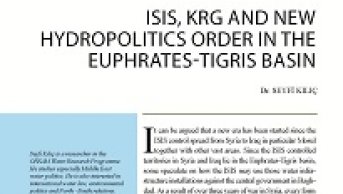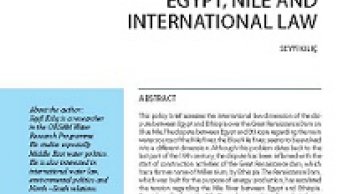The Water Problem is Deepening between Iraqi Central Government and Kurdish Regional Government

Despite the frequent attempts to indicate its neighbouring states as the cause of water shortage in Iraq, it is clear that the main issue is ineffective management of water sources in the country. The lack of good practices in water management has been one of the natural consequences of years of conflict in Iraq, this problem evolved into a new dimension after the American invasion. There are some problems regarding the water management outlined in the 2005 constitution accepted after the end of Saddam regime.
One of the main problems is the regulation, which classifies rivers as main - stream and tributary; and then gives the management of main streams to the Iraqi Central Government whilst the control of tributaries belongs to the Kurdistan Regional Government. It is generally accepted that the planning and management of water sources should be based on the location of river basins; therefore it was inevitable that there would be problems in the aforementioned arrangement due to two different governing bodies’ involvement. It seems that the on-going disagreement between Iraqi Central Government and the Kurdistan Regional Government regarding oil export is also being mimicked in their water dispute.
The Iraqi Central Government had asked KRG to release water from the dams under latter’s control for irrigation of the agricultural areas in Diyala, Kirkuk, Salahaddin and Baghdad; soon after deciding not to pay in officials’ salaries in KRG as a result of the tension regarding oil export. However, this demand was not only declined by the KRG; the General Director of Dams, Akram Resul dismissed their request by saying “It is their (Iraqi central government) problem, not ours”.
As a result of the long-term political conflict in Iraq, every means is used as a bargaining chip in order to put other sides in a difficult position and this negative approach unfortunately become a norm in water issues as well.
Another example is from 2014. As a result of maladministration of water resources for years, Iraq has serious water shortage problem alongside serious disputes regarding water quality and quantity amongst regions.
Earlier in the water shortage discussions, Iraqi officials were blaming neighbouring countries, especially Turkey, for excessive usage of water; however, there are recent talks about inconsiderate water consumption of Iraqi northern cities and its adverse effects in the south. It is seen that Basra, the city where Euphrates and Tigris spill out into the Shatt al-Arab, warns its neighbour city Dikhar (Nasiriye) because of the serious problems caused by low water quality and quantity. There were news in the media regarding water disputes amongst cities of Iraq such as the mayor of Basra, Majed Al Nasrawi threatened Dikar with not sending fuel oil, while accusing the activities in Dikar of spoiling the quality and quantity of the water before reaching Basra.
All these indicate the urgency and necessity of holistic water management plan for the whole country in Iraq. It is expected to have similar problems also with the KRG in near future. The KRG’s rejection of water release from the Dokan and Darbendikan dams for irrigation in agricultural areas shows the severity of the problem. Many tributaries of Tigris are in the control of KRG. Taking into account the constitutional rights of KRG, we can expect a serious crisis in terms of benefiting from the water resources in the country in coming irrigation season. Another noteworthy point is that despite the Musul dam on Tigris’s main stream is not considered as KRG’s control, in practice the opposite is the reality. Using water for political purposes in internal politics of Iraq will not only open new areas of conflict; but also calcify existing insecurities among different ethnic groups for years to come.











